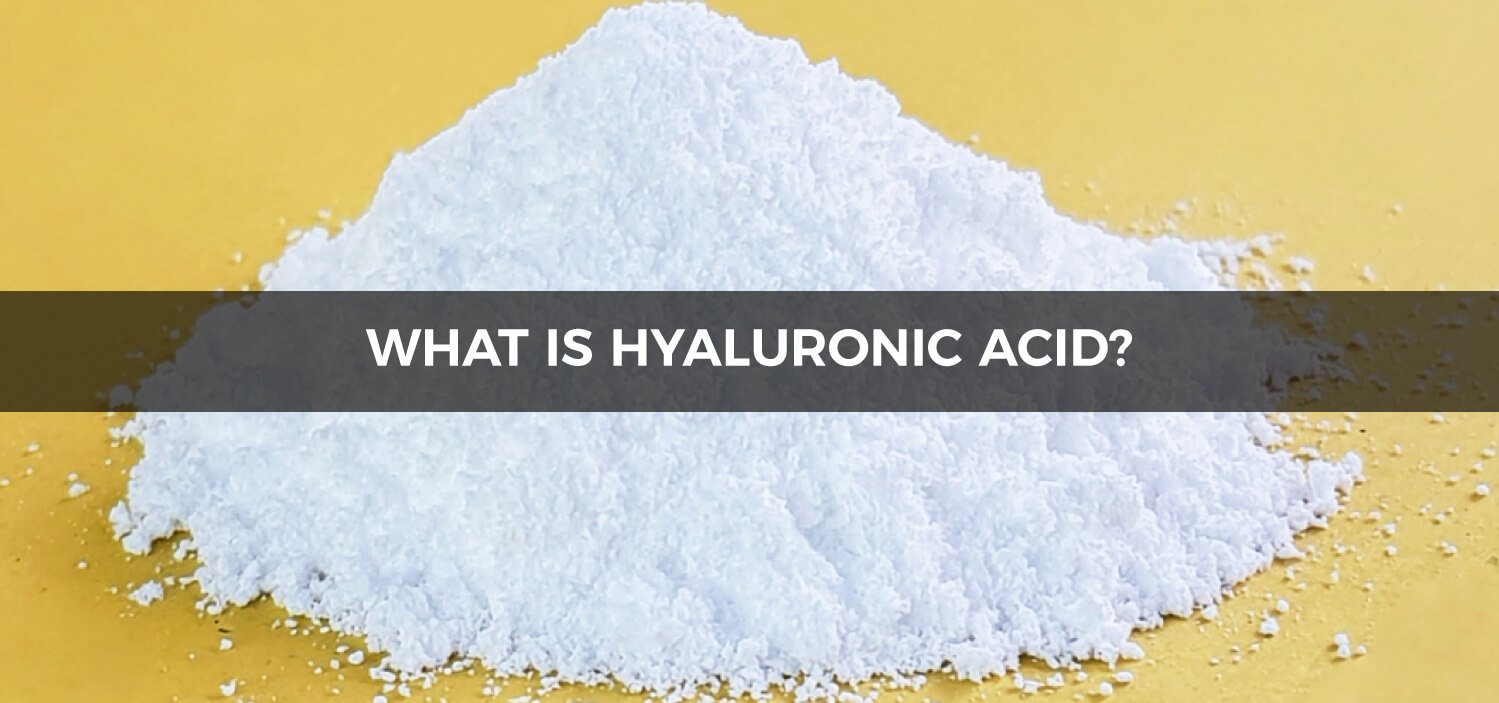Table of Content
- Introduction
- Hyaluronic Acid Uses
- Hyaluronic Acid for Skin
- Hyaluronic Acid for Face
- Hyaluronic Acid for Hair
- Side Effects of Hyaluronic Acid
- Why Choose Titan Biotech’s Hyaluronic Acid?
- Frequently Asked Questions (FAQs)
- How to use hyaluronic acid?
- Is hyaluronic acid good for oily skin?
- Does hyaluronic acid darken skin?
- Can hyaluronic acid be used with retinol?
- Can hyaluronic acid be used with vitamin C?
- Does hyaluronic acid help with acne?
- Who should use hyaluronic acid?
- What does hyaluronic acid do?
- How hyaluronic acid works on the skin?
- References
Introduction
Hyaluronic acid is a polysaccharide that has many different functions in the body. It is a significant synovial fluid component, lubricating joints and absorbing shock. Hyaluronic acid also plays an essential role in tissue repair, as it can hold up to 1,000 times its weight in water.
Hyaluronate is a naturally occurring molecule that is found in all living organisms. It has been found to have many beneficial effects on the skin, joints, and connective tissue. Hyaluronic acid is a molecule made of long chains of sugars and amino acids. It is found naturally in human joints, cartilage, and skin. When injected into the knee joint as a gel or solution, hyaluronic acid helps to lubricate the joint by attracting water from within the body and surrounding tissues, which helps reduce inflammation and pain.
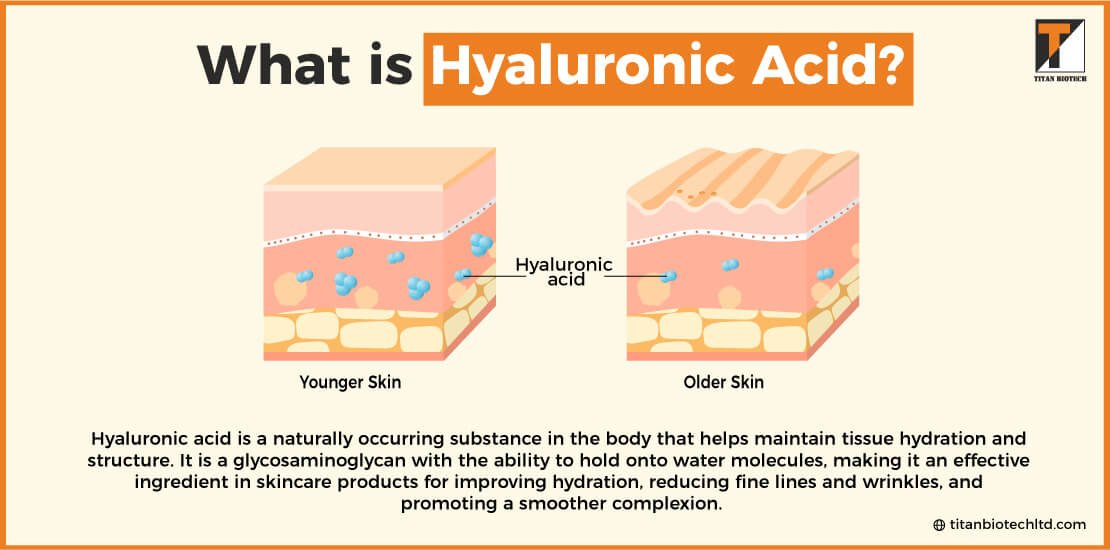
Hyaluronic acid is a vital component of joint fluid that lubricates the joint and cushions the cartilage. It also acts as a shock absorber in joints, helps regulate the body’s temperature, and maintains healthy levels of moisture within the body.
Hyaluronic acid supplements can be taken orally or applied topically to the skin. The supplement increases the hyaluronan in the synovial fluid, which can then be absorbed into nearby cells.
Hyaluronic Acid Uses
-
To treat joint-related pain
Hyaluronic acid injections are injected into the knee joint area of people with OA or other arthritic conditions, such as rheumatoid arthritis and psoriatic arthritis. The injection is made from hyaluronic acid extracted from animal sources such as pigs’ eyes or plants such as okra and cottonseed hulls. The amount used in each patient varies depending on the size of their joint space, age, weight, and other factors.
Depending on your doctor’s advice, they are given once or twice weekly.
For example, a 60-year-old woman who weighs 140 pounds and has severe knee OA might receive an initial dose of 100 milliliters (mL). After one month, her doctor may prescribe another 200 mL every two weeks until she reaches 600 mL over four injections.
Hyaluronic acid is similar to a substance that occurs naturally in the joints. It helps to cushion and lubricate the bones, cartilage, and synovial fluid. Injected into the joint, hyaluronic acid reduces inflammation and helps repair damaged cartilage. The procedure is done under local anesthesia and lasts about 30 minutes.
-
Used in the skincare and healthcare industry
Even though it is a natural product, hyaluronic acid is still a highly effective anti-aging ingredient. The main reason skincare and haircare industries use HA in their products is that it creates a natural barrier that time and radical damage has caused and will prevent further loss of moisture, thus allowing one to age gracefully. It can help your hair, too. Besides firmer skin, HA will prevent a dry scalp and hair from thinning and eventually falling out.
Hyaluronic Acid for Skin
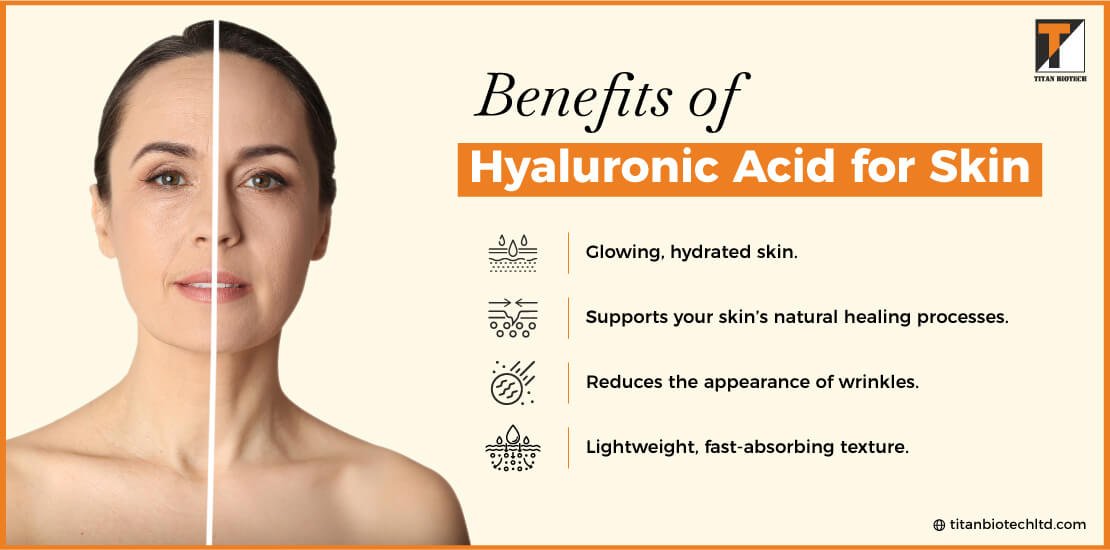
Hyaluronic Acid is a naturally occurring component of our bodies, but it’s also found in many cosmetics and skincare products. An effective moisturizer helps slow aging, making your skin look younger and more radiant.
It is an excellent addition to your skincare routine if you’re looking for a way to combat the signs of aging. It’s a naturally occurring substance in your body, and it helps with cell turnover, lubrication, and hydration. HA can be found in many different products because it’s an ingredient that does so much more than keep skin hydrated.
When applied topically, hyaluronic acid helps stimulate collagen production. This is why it’s used in anti-aging products — it helps maintain healthy skin.
Hyaluronic Acid for Face
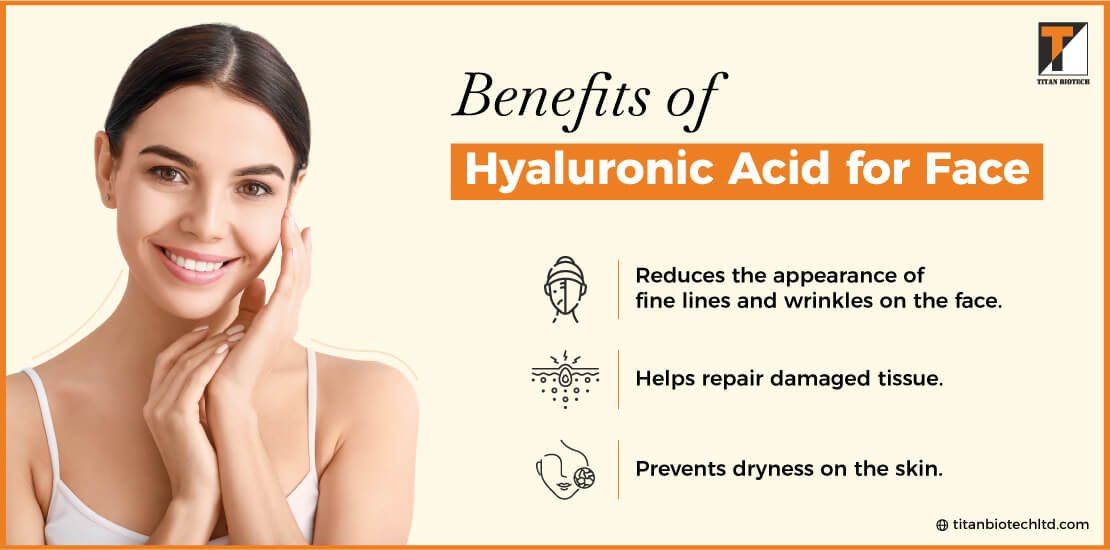
It is also an excellent ingredient for stimulating collagen production. This helps to maintain elasticity, firmness, and hydration.
Hyaluronic acid has been used for centuries by cosmetologists as a bulking agent and to help with moisture retention. The main benefits of using HA are:
- Reduces the appearance of fine lines and wrinkles on the face.
- Prevents dryness on the skin.
- Helps repair damaged tissue.
- It Lubricates Skin: The thicker the skin is, the less friction between cells as they slide over each other. If this sliding action continues constantly, it can lead to premature aging of the epidermis (the outermost layer of skin).
Hyaluronic Acid for Hair

Hyaluronic Acid is an excellent humectant that offers many benefits to your hair and scalp. It’s a natural, non-toxic product that can be used on all hair types and is easy to use.
Hyaluronic acid is a humectant that works by holding water in the skin. It is effective in helping dry, brittle hair retains moisture.
Hyaluronic acid is absorbed quickly into the scalp, holding up to 1,000 times its weight in water. That’s a lot of hydration! Hyaluronic acid is one of the best moisturizers for your scalp because it also works as an anti-humectant, which means it helps stop the formation of frizz and flyaways.
The benefits of hyaluronic acid for your hair include the following:
- It helps reduce frizziness and flyaway tendencies.
- It makes your hair soft and shiny by retaining moisture on the surface of your strands.
- It boosts elasticity by binding itself to keratin proteins in your hair follicles, making them stronger and healthier.
The HA molecule can hold 5 times its weight in water molecules (or more), so it’s great for strengthening weak or fine strands. Its ability to absorb moisture helps keep your hair bouncy all day!
Side Effects of Hyaluronic Acid
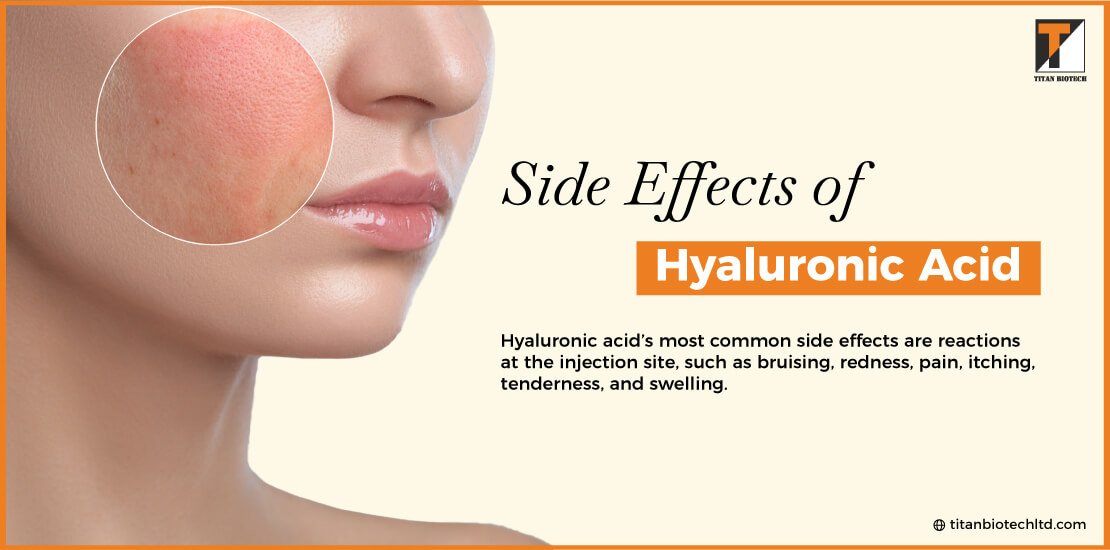
Hyaluronic acid’s most common side effects are reactions at the injection site, such as bruising, redness, pain, itching, tenderness, and swelling.
These rare reactions can be severe enough to require medical attention. Patients who experience a severe allergic reaction related to hyaluronic acid should seek immediate medical care.
Hyaluronic acid injections can also cause infection at the injection site. This is uncommon but may occur if bacteria enter an area where they were not intended to enter and multiply. If this happens, it will become an abscess and must be treated by a physician.
Why Choose Titan Biotech’s Hyaluronic Acid?
Titan Biotech is a bulk supplier & manufacturer of hyaluronic acid supplements worldwide. We have been in this industry for the last 25 years and have the experience and knowledge to produce high-quality hyaluronic acid powder.
Hyaluronic Acid Powder is a hydrocolloid that can be easily absorbed into the skin, joints, and muscles. It is used in topical creams and ointments to heal wounds and skin conditions such as eczema, psoriasis, contact dermatitis, and other inflammatory skin conditions.
Titan Biotech Limited is known for its quality service, fast delivery, and competitive price range. Our primary focus is to provide the best services to our customers by providing them with quality products at as low prices as possible while maintaining high safety and compliance standards.
Frequently Asked Questions (FAQs)
How to use hyaluronic acid?
Hyaluronic acid can be applied to the skin as a serum or moisturizer to hydrate and plump it. It can also be combined with other substances for skincare, eaten as food or supplement, or utilised in various ways for overall skin health.
Is hyaluronic acid good for oily skin?
Hyaluronic acid benefits oily skin by offering light hydration without producing additional oil, stopping the skin from having too much oil, and helping minimize the look of pores for a smoother, more uniform complexion.
Does hyaluronic acid darken skin?
Hyaluronic acid won’t make your skin darker. It is a secure and valuable component of skincare that can genuinely aid in brightening and balancing skin tone. While taking hyaluronic acid for the first time, any temporary redness or irritation should disappear within a few days.
Can hyaluronic acid be used with retinol?
Hyaluronic acid and retinol can be utilized to enhance the texture and look of the skin. Retinol-induced dryness or irritation can be mitigated by hyaluronic acid, which also provides hydration. Hyaluronic acid should be applied first, then retinol, steadily increasing over time to prevent irritation. Before beginning a new skincare routine, perform a patch test and see a physician.
Can hyaluronic acid be used with vitamin C?
Indeed, hyaluronic acid and vitamin C can be combined to give the skin even more advantages. Hyaluronic acid hydrates and firms the skin, while vitamin C brightens and protects the skin. Add hyaluronic acid, then vitamin C. Before beginning a new skincare routine, perform a patch test and see a physician.
Does hyaluronic acid help with acne?
Indeed, hyaluronic acid can aid in treating acne-prone skin by hydrating the skin lightly without clogging pores, calming inflamed skin, and enhancing the skin’s general texture and look. Always patch test and discuss with a dermatologist before use.
Who should use hyaluronic acid?
Hyaluronic acid has numerous advantages, especially for people with dehydrated skin or those trying to delay the effects of aging. Its lightweight moisture suits all skin types, including those with oily or acne-prone skin. Before using, always perform a patch test and visit a dermatologist.
What does hyaluronic acid do?
Intense hydration from hyaluronic acid plumps and moisturizes the skin for a youthful appearance. Also, it can lessen the visibility of fine wrinkles and enhance skin texture while soothing sensitive skin. It’s a flexible substance that helps practically everyone who wants better skin.
How hyaluronic acid works on the skin?
Hyaluronic acid attracts and retains moisture in the skin, forming a barrier to prevent moisture loss and improve hydration levels. This helps reduce the appearance of fine lines and wrinkles and soothes irritated skin.
References
- https://www.mdpi.com/2073-4409/9/7/1743
- https://www.sciencedirect.com/science/article/abs/pii/B9780128002698000099
- https://www.sciencedirect.com/science/article/pii/S0141813019366255
